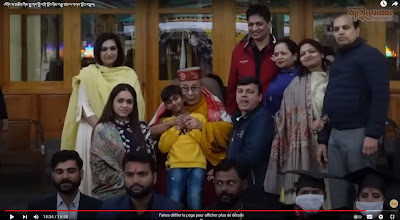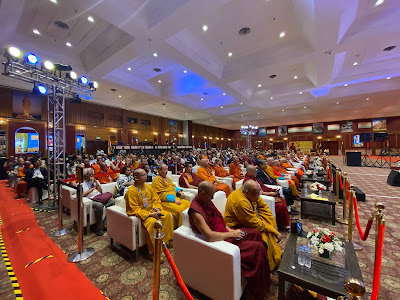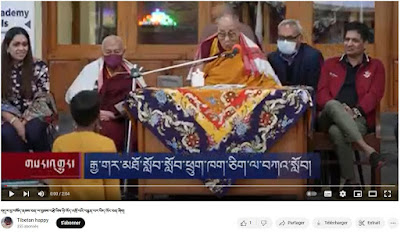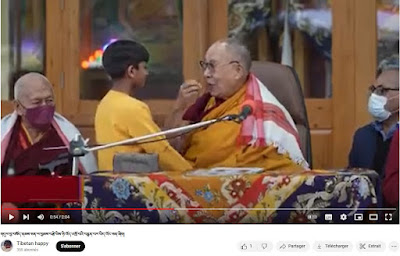 |
| Indian PM Modi at the Global Buddhist Summit in Delhi, April 2023 |
In its history Buddhism has often been used as a “soft power”, and this is still true nowadays. After a relatively successful spread of Buddhism globally in the second half of the XXth century, including its come-back in India, the Indian government of Modi sees the interest of Global Buddhism as one of India’s “soft powers”. After all, India (and Nepal) is the area where Buddhism first appeared, its homeland so to speak. India seems to want to remind the world of this fact, perhaps especially since other nations and ethnic forms of Buddhism have tried with more or less success to use Buddhism as a soft power.
Modi’s inaugural speech[1] (20/04/2023) to the Global Buddhist Summit in Delhi was quite clear on that.
“We are going through the most challenging time today. For many months, there is a war between two nations and the world is going through economic volatility. Threats of terrorism and religious fanaticism are attacking humanity’s soul,” he said.Buddhism is often considered a religion of peace and harmony, respecting the ways and beliefs of others.
PM Modi added that climate change, with melting glaciers and disappearing ecosystems, was plaguing the world today. “But, at the same time, there are crores of people like you, who believe in the Buddha. This hope, this faith is the biggest strength of this earth. When this hope gets united, the Buddha’s Dhamma will become the world’s belief and Buddha’s realisation will become the belief of humanity.” (The Indian Express, Buddhist faith biggest strength in times of war, economic crisis, says PM Modi, April 21, 2023 02:52 IST)
“Friends, today we see that the thinking of imposing one’s own thoughts and beliefs onto others is becoming a big problem for the world.” “He added that the Buddha’s teachings included that one should first look at one’s own conduct before preaching to others.” The Indian ExpressReligions, and in this case (global) Buddhism, could help the world to free itself from the grip of materialism and selfishness.
“Had the world followed the teachings of Buddha, we would not even have faced a crisis like climate change. This crisis developed because some nations stopped caring about others, about the future generations in the last century. For decades, they were of the view that the effect of this tampering with nature would not affect them. Those countries blamed it on others only. But Lord Buddha has clearly said in the Dhammapada that as a water pot is filled with drop by drop, so the repeated mistakes become the cause of destruction.” (Modi’s inaugural speech)
“Today, it is very necessary that the world should come out of the definitions of materialism and selfishness and imbibe this feeling of ‘भवतु सब्ब मंगलन्’ (May all be well).” (Modi’s inaugural speech)
 |
| Dalai Lama present at the second day of the GBS |
The Dalai-lama attended the Global Buddhist Summit on its second day, he was not present on the first day and at Modi’s inaugural speech.
“ Delegates from 30 countries were in attendance. The PM offered robes to 19 prominent monks from across the world, though Tibetan Buddhism leader, the Dalai Lama, was not among those who attended the event.” (Jagran, 'India Gave World Buddha Not Yuddha': PM Modi Bats For Buddhist Teachings To 'Solve Modern World Problems' 20/04/2023)A meeting between PM Modi and the Dalai-lama would probably have displeased China. Yet, the Dalai-lama seems to have moved closer to the more traditional views of Modi, when the Dalai-lama declares:
“Sometimes I jokingly say that in times past we Tibetans were the students and you Indians were the teachers, but now, when Indian has come so much under the influence of western thought, it is we Tibetans who have kept ancient Indian knowledge and values alive.” (Buddhist Times)How exactly does the Nobel Prize winner of 1989 see the excessive influence of western thought on India? On December, 21st 2022, the Dalai-lama declared :
”[...] ancient Indian education is fundamentally focused on the education of the mind and inner values whereas the modern/western education mainly focuses on the propagation of material or external values” (Tibet.net)
In a recent French book “Le Pacte des autocrates” (Isabelle Mandraud, Julien Théron), published on April 20th 2023 (Rober Laffont), the names of some autocrates are mentioned on the cover : Putin, Xi Jinping, Erdogan, Assad, Raïssi, Maduro, Modi.
"These regimes organize themselves for mutual protection, to the point of forming an 'autocratic international'. They vote together in the United Nations, cooperate on security matters, share propaganda, develop trade, supply each other with weapons, and form military alliances.”
 |
| Buddhist leaders on the GBS stage |
To free themselves of the influence of western countries, a return to their own respective national traditional values is proposed as the obvious solution, where the respective religious leaders are invited to give a helping hand to autocratic leaders. It is suggested the “Western” values are then substituted by more traditional ones. Democratic ones by autocratic ones, women’s rights tend to disappear, virility is revalorised, “Western” sexual mores are rejected, the rights of the individual tend to dissolve into the best interest of the nation, etc. Democracies are not necessarily free of autocratic elements and autocracies may have democratic elements, it’s more a spectrum than a clear-cut dichotomy.
When one sees footage of the GBS, it is striking that there are hardly any female Buddhists on the stage, but merely men in robes, and that seems to confirm the reality and perhaps the wish of (global) Buddhism to indeed stick to its traditional values. “The path of Buddha is the path of the future and the path of sustainability,” Modi said, what will be the role of women on that path?
 |
| Dalai Lama surrounded by members of M3M Basant Basal's family in Dharamsala |
One reaction that had been shared a lot in the aftermath of the “Suck my Tongue” incident was that presented as that of “a Tibetan mother” (Tenzin Pema), who writes “you superimpose your own hypersexualised views/culture or negative experiences on everything and view every act of pure love through that lens[3]". It is not clear who is the “you” that is referred to, but the “hypersexualised views/culture” probably refers to Western views/culture, where “sexualisation” (e.g. in Freudian psychology) and critical thinking are not eschewed, including regarding “acts of true love”. They may be seen as negative, and perhaps threatening, from religious points of view, but they are as threatening to “Western” religious values as they are to “Eastern” ones. This doesn’t mean that the one needs to be eliminated in favour of the other, but their co-existence could ideally create some space and freedom.
 |
| Trump Jr India's first Trump Tower Project by Lodha Group in Mumbai, Dec 2019 |
What autocrats don’t condemn is trade and they don’t object to capitalist values, even Western ones, but they may prefer to do business with other autocrats or with those who don’t mind doing business with autocrats, and won't be too concerned about Social, ethical and environmental responsibility.
 |
| "Trump Jr. flanked by Basant Bansal of M3M developers and Kalpesh Mehta of Tribeca Developers raise a tost to celebrate the launch of Trump Towers in Delhi NC during a gala dinner in New Delhi. (Image: PTI) |
As I mentioned in my blog The builder of the 4 Indian Trump Towers and the Dalaï-lama, the family of the boy from the “Suck my tongue” incident, is the builder of the 4 Indian Trump Towers, M3M (stands for “Magnificence in the Trinity of Men, Materials & Money"), “under a brand licence from The Trump Organisation”. The M3M Group has also links with the Singh brothers[4], and the spiritual leader of one of India’s leading religious sects—the Radha Saomi Satsang Beas, guru Gurinder Singh Dhillon.
 |
| PM Modi visits Radha Soami Satsang Beas in Punjab, meets chief Dhillon (photo ANI) |
President Donald Trump was not an autocrat, but the “Western values” he propagated were certainly more acceptable to entrepreneurs from autocratic-like countries he is/was in business with. Trump Jr is now leading The Trump organisation and doing business with M3M’s Basant Bansal and other Indian entrepreneurs who pride themselves of traditional values and like to display themselves with gurus, just like their PM.
But what will the “global Buddhism” of the future PM Modi is thinking of be like? And how do the Buddhist leaders listening to Modi’s speech at the GBS imagine their global Buddhism, leading the way to the world, to be like? Will it be the traditional ethnic forms of Asian Buddhism, “decolonised”, “de-orientalised” without disturbing “Western values/culture”? Or a globish Buddhism that is so out of touch with both genuine Eastern and Western values? To be frank, I don’t think that any of these two forms of Buddhism (or of any other religion) can and should lead the world forwards.
[1] “DISCLAIMER: This is the approximate translation of PM’s speech. Original speech was delivered in Hindi.”
[2] Le Monde diplomatique, Hindu nationalism’s global networks, Ingrid Therwath, February 2023
[3] “Because a kiss or a "po" on the lips given by elders to little children and by young children to elders is common in our culture and another sign of pure, unabashed love -- until of course, you superimpose your own hypersexualised views/culture or negative experiences on everything and view every act of pure love through that lens; in such an instance, even the sight of a grandfather kissing his own grandson will be misconstrued as "child abuse."
[4] “But they also said it would be “untrue" to suggest that the guru was a cause of their group’s financial troubles. “Malvinder and Shivinder are unequivocal about this: Mr. Dhillon is their spiritual master," the brothers wrote. “He has only ever acted out of love and has only ever had their best interests at heart."



































